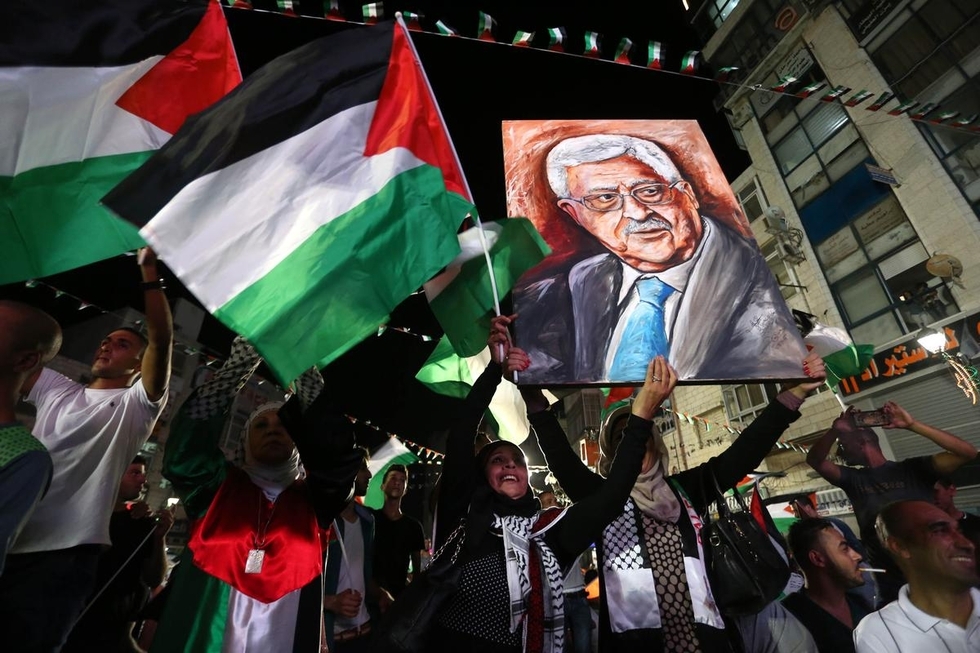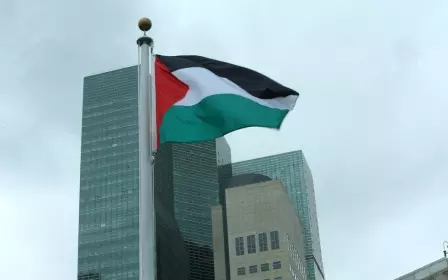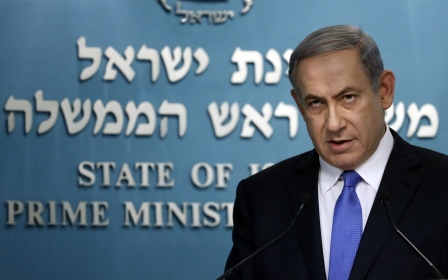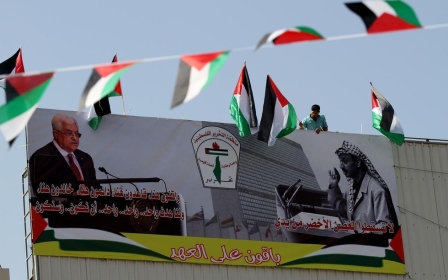At the UN, Abbas wastes another opportunity for Palestine

Rumours had been swirling prior to Palestinian Authority (PA) President Mahmoud Abbas's speech at the 70th UN General Assembly on Wednesday, at which his country's flag was raised for the first time. Speculation was fuelled by Abbas reportedly promising that his speech would be a "bombshell".
Would he announce his resignation? The PA's dismantlement? His official abandonment of the disastrous Oslo Accords, of which he was an architect? None of the above. His speech is being interpreted in some quarters as abandoning the accords, but he did not specifically say that.
He said the PA would no longer be bound by previously signed agreements, but his mention of the accords preceded that statement, so whether there was a direct link is debatable. Abbas could have so easily been clearer about such an important declaration that his lack of clarity was likely by design.
We were treated to a fairly run-of-the-mill speech, similar to those he had given previously at the UN. No wonder the international media largely glossed over it, arguably giving more coverage to the flag-raising. Abbas basically made accusations against Israel and asked for international support - and that was pretty much it. No new vision or strategy to lead Palestinians to their long-denied right to self-determination.
The speech was as symbolic and inconsequential as the flag-raising. That was no surprise - what was surprising is that anyone expected any different from Abbas. He was true to form, not that his predictability has done any good for the Palestinian cause.
The only noteworthy thing he said came toward the end of his speech. "As long as Israel refuses to commit to the agreements signed with us... and as long as Israel refuses to cease settlement activities and to release the fourth group of Palestinian prisoners in accordance with our agreements, they leave us no choice but to insist that we will not remain the only ones committed to the implementation of these agreements," Abbas said.
"We therefore declare that we cannot continue to be bound by these agreements, and that Israel must assume all of its responsibilities as an occupying power." However, his words are so vague that he has rendered them virtually meaningless.
This was no oversight - Abbas was giving himself enough wiggle room to not be held to any specific pledges or threats. This could facilitate him backing down or making u-turns afterward. As such, the response from Israel and its allies will likely be a collective shrug.
Wasted opportunity
This was an opportunity - a global platform - for Abbas at an important anniversary for the UN, where the Palestinian flag was flying, at a time when other crises in the region and beyond have pushed his people's cause off the international and news agendas. He wasted it.
Which of the numerous agreements signed by the PA in the 22 years since it was established does Abbas intend to abandon? All of them? He did not specify, of course.
In addition, the only effective way to force Israel to assume its responsibilities as the occupying power would be to dismantle the PA, since its establishment allowed Israel to effectively sub-contract its occupation. This possibility has been raised in the past. However, there was no such announcement, nor any details of how Abbas plans to pass the buck back to Israel.
Boycott, security and elections
He reminded his audience that "the decisions of the Palestinian Central Council last March are specific and binding". He would do well to remind himself of that. The decisions include suspending “security” coordination with Israel, boycotting "all Israeli products and not only those coming from Israeli settlements," and holding presidential and parliamentary elections.
Six months on, Abbas has yet to implement any of these decisions. His UN speech did not mention a boycott or cutting “security” coordination with Israel. He did say that "we seek to hold presidential and legislative elections," but he has been saying this for quite some time (his term ended six years ago) without actually holding them, as if merely expressing a desire to do so will suffice.
Abbas has nothing new to offer his people - that has been clear for far too long. According to a poll last month by the Palestinian Centre for Policy and Survey Research, 65 percent of Palestinians want him to resign. No wonder he is no rush to hold elections. His major policies - such as “security” coordination, endlessly fruitless negotiation and opposition to a boycott of Israeli goods - run counter to the wishes of his own people, expressed in poll after poll.
Time to go
It is high time for him to resign, and for elections to be held to replace him, including the candidacy of Marwan Barghouti, the Fatah leader who has been in an Israeli prison for 13 years. PLO secretary-general and chief negotiator Saeb Erakat, who is close to Abbas, acknowledged last week that "no one gets more in the polls" than Barghouti.
A victory by him would put Israel in the unprecedented situation of imprisoning an elected president. It would finally give Palestinians a real sense of hope, which they have been lacking for so long. It would contribute to healing national and political divisions, which is crucial to achieving Palestinian rights. It would mean that Palestinians finally have a president that is for the people and of the people.
- Sharif Nashashibi is an award-winning journalist and analyst on Arab affairs. He is a regular contributor to Al Arabiya News, Al Jazeera English, The National, and The Middle East magazine. In 2008, he received an award from the International Media Council "for both facilitating and producing consistently balanced reporting" on the Middle East.
The views expressed in this article belong to the author and do not necessarily reflect the editorial policy of Middle East Eye.
Photo: Palestinians wave their national flags as they watch a live-screening of president Mahmoud Abbas' speech followed by the raising of the Palestinian flag at the United Nations headquarters in New York, on September 30, 2015 in the city of Ramallah (AA).
Middle East Eye propose une couverture et une analyse indépendantes et incomparables du Moyen-Orient, de l’Afrique du Nord et d’autres régions du monde. Pour en savoir plus sur la reprise de ce contenu et les frais qui s’appliquent, veuillez remplir ce formulaire [en anglais]. Pour en savoir plus sur MEE, cliquez ici [en anglais].





